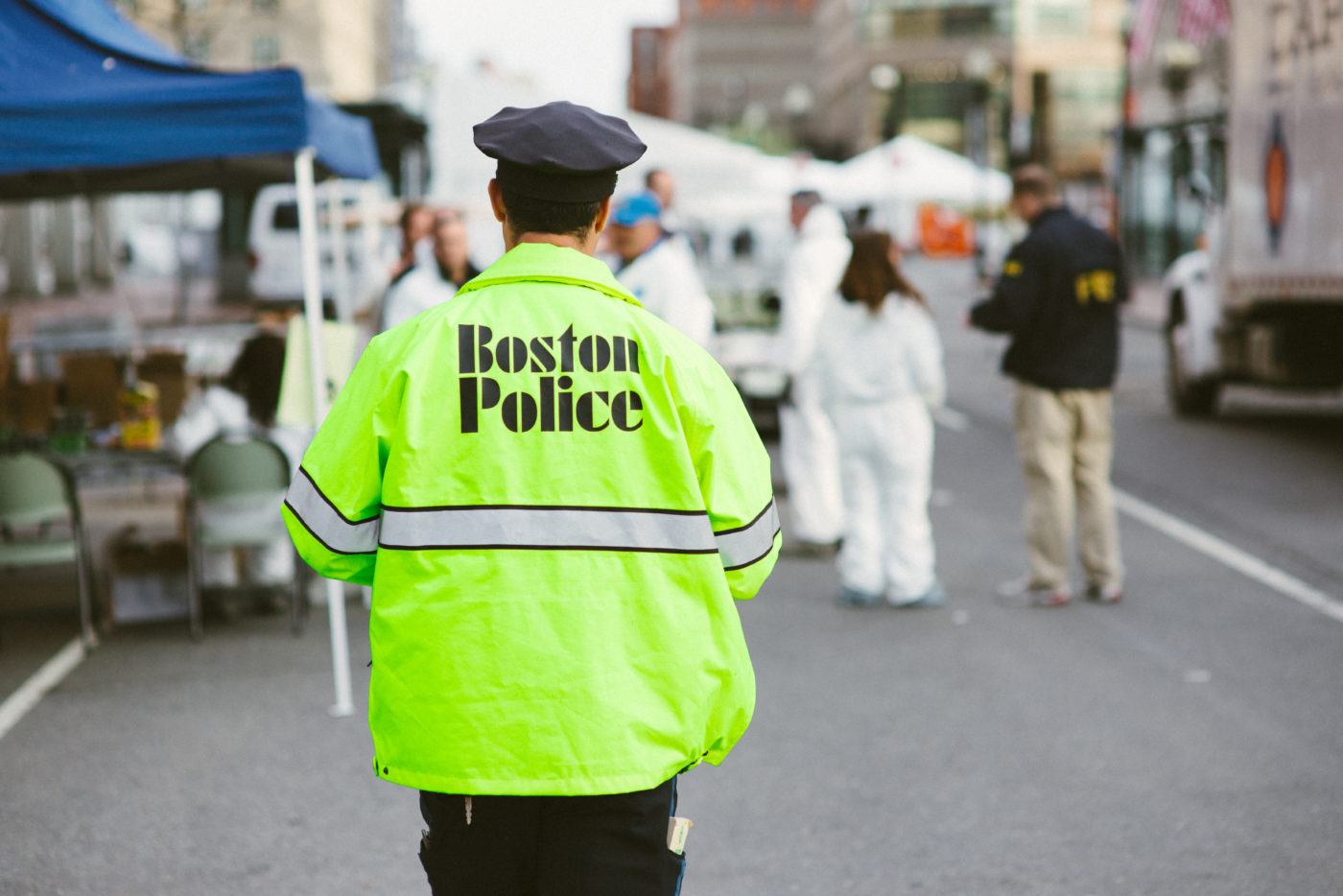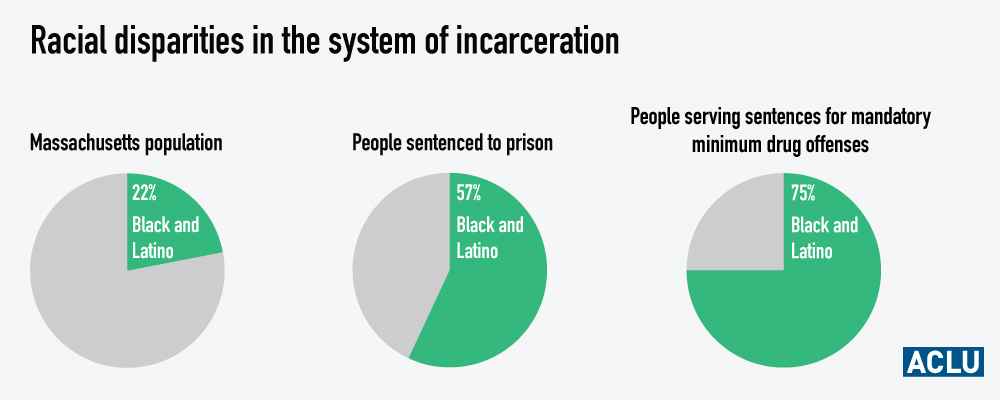Over two-dozen civil rights, civil liberties, social justice, and religious organizations call on the Boston Police Department (BPD) to change its policies to protect the most vulnerable from the Trump administration's attacks. Specifically, the coalition asks BPD to end participation in so-called "countering violent extremism" programs; change its privacy policy to forbid the collection and sharing of information about people not suspected of crimes; cease collaboration with the FBI's Joint Terrorism Task Force; and endorse the Safe Communities Act.
In May 2017, the five organizations leading the coalition—the ACLU of Massachusetts, Muslim Justice League, Council on American-Islamic Relations Massachusetts, Islamic Society of Boston Cultural Center, Jewish Voice for Peace - Boston, and Digital Fourth—met with Boston Police commissioner William Evans and his staff to discuss these issues. Following the meeting, we sent a letter to Commissioner Evans and to the City Council, outlining our demands. On September 19, 2017, we published that letter, along with endorsements for our demands from over two-dozen groups working on civil rights, civil liberties, and human rights issues across the city.
The groups demand BPD:
- Focus violence prevention efforts on reducing all violence that victimizes communities, and avoid involvement in outreach programs that suggest lawful behaviors or ideas protected by the First Amendment (such as information seeking, political speech, mistrust of law enforcement, or religious beliefs and practices) are precursors to crime.
- End involvement in community outreach programs (called by any name, and funded by any means or not at all) that credit false and stigmatizing theories about predispositions toward violence or “extremism,” including the Youth and Police Initiative Plus.
- Develop—through a publicly advertised process with opportunity for formal public input—and publicize stringent rules for separating community outreach initiatives and social services initiatives from intelligence gathering operations.
- Modify the Boston Regional Intelligence Center (BRIC) privacy and civil liberties policy to institute a criminal predicate requirement for surveillance, intelligence collection, and information sharing. Doing so will go a long way towards ending surveillance based on political opinion, race or religion, which tars BPD's image, wastes public resources, and harms community trust.
- Cease collaboration with the FBI’s Joint Terrorism Task Force (JTTF). BPD should not engage in suspicionless investigations, either at the local or federal level. Yet the FBI does not require a criminal predicate for JTTF investigations. Reporting by the Guardian newspaper shows the result of this policy problem: a BPD officer tasked to the JTTF was involved in improper surveillance and targeting of the political activity of a Boston-based Dakota Access Pipeline protester in North Dakota. These kinds of surveillance operations harm community trust, chill political speech, and do nothing to advance public safety.
- Endorse and publicly support the Massachusetts Safe Communities Act (S.1305, H. 3269). We appreciate the Commissioner’s statements in support of defending immigrant communities' safety in Massachusetts. An important step toward defending immigrants' safety against family separation; expulsion to face possible persecution, trafficking, famine and/or disease; and abuse by local actors who would exploit their immigrant status is passage of the Safe Communities Act. The Act would bar Massachusetts agencies from contributing towards a discriminatory “Muslim Registry,”enhance due process rights for immigrants, and ensure police resources are spent protecting communities—not harming them by involving them with Trump’s Immigration and Customs Enforcement (ICE) agency.
The following organizations have endorsed the demands: African Community Economic Development of New England (ACEDONE), ACLU of Massachusetts, Asian American Resource Workshop, Black & Pink, Boston Workmen's Circle for Jewish Culture & Social Justice, Brazilian Womens Group, Chelsea Collaborative, Council on American-Islamic Relations MA, Defending Rights & Dissent (formerly BORDC), Digital Fourth, Families for Justice as Healing, Harvard Anti-Islamophobia Network, IfNotNow Boston, Islamic Society of Boston Cultural Center, Jewish Alliance for Law & Social Action, Jewish Voice for Peace - Boston, Lawyers Committee for Civil Rights, Massachusetts Pirate Party, Massachusetts Refugee and Immigrant Advocacy Coalition (MIRA), Muslim Justice League, National Lawyers Guild-Massachusetts Chapter, No Drones Eastern Mass, No Drug Arrests Collective (NDAC), Stuck on Replay, Student Immigrant Movement (SIM), Suffolk Muslim Law Students Association, Showing Up for Racial Justice (SURJ)-Boston, Unitarian Universalist Massachusetts Action Network, & Unitarian Universalist Service Committee.
Read the June 20 letter to BPD
Date
Tuesday, September 19, 2017 - 12:30pm
Featured image
Show featured image
Hide banner image
Related issues
Freedom of Religion and Belief
Immigrants' Rights
Police Accountability
Privacy and Surveillance
Racial Justice
Show related content
Tweet Text
[node:title]
Type
Menu parent dynamic listing
Style
Standard with sidebar
What state saddled its residents with 23,000 wrongful drug convictions, then dedicated millions of taxpayer dollars and years of public labor opposing efforts to get justice for the wrongfully convicted? Surprise, it’s progressive Massachusetts.
Massachusetts is seriously regressive on criminal justice issues. Despite massive scandals at the Hinton and Amherst drug labs and glaring racial inequities, our elected leaders too often fail to acknowledge what the criminal punishment system is actually doing — or to whom or how. But it doesn’t have to be this way. In the wake of two historic drug lab scandals, resulting in tens of thousands of tainted convictions and ruined lives, we in Massachusetts have an opportunity and obligation to fix the system.
Thus far, the opposite has happened here in the Bay State. Despite widespread knowledge of the abuse by Annie Dookhan at the Hinton lab and Sonja Farak at the Amherst lab, too many of the state’s top movers and shakers have ignored the problem. It took repeated legal challenges by the ACLU, the Committee for Public Counsel Services (CPCS), and lawyers at Fick & Marx and Foley Hoag to focus official attention on the extent of injustice arising from the drug lab scandals.
After years of foot-dragging by prosecutors, the Massachusetts Supreme Judicial Court in January ordered district attorneys to submit lists by April 18, 2017, of convictions they will slate for dismissal as a result of tainted evidence in the Dookhan scandal. The prosecutors reportedly will seek to vacate the vast majority of these cases.
If you think that is shocking, consider this: Over an 8-year period, roughly one in three drug cases prosecuted by Boston’s Suffolk County District Attorney Dan Conley may have involved tainted evidence.
An ACLU data scientist analyzed the records and discovered that 62 percent of Dookhan-tainted convictions were for drug possession, and over 90 percent were prosecuted in low-level, district courts. These facts contradict assertions by the state’s district attorneys that public safety required the preservation of the tainted convictions.
As we get closer to that April 18 day of reckoning, the people of Massachusetts should know that while the corrupt chemist from the Hinton lab has already been convicted, incarcerated, and released, the rest of the justice system has done very little to address the fundamental failures that allowed the so-called “rogue” chemist to violate so many people’s rights for so long.
Most media attention has focused on Dookhan, while the role of the system around her has barely been discussed. It was that system that enabled her abuse, covered it up, and then fought to preserve the convictions that stemmed from it. So as you read media coverage and listen to elected officials talk about the drug lab crises in the coming weeks, remember the following context.
ACLU of Massachusetts team that has fought for justice for thousands of people who were convicted by tainted evidence in the Annie Dookhan drug lab scandal: Adriana Lafaille, staff attorney; Matt Segal, legal director; Carl Williams, staff attorney
First, the soon-coming dismissal of most of the tainted Hinton lab convictions would not have happened without nearly five years of litigation by ACLU, CPCS, and pro bono attorneys. The district attorneys and the rest of the system were prepared to let these tainted convictions stand, even though that would have meant that thousands of victims of the crisis — people who have to live with the collateral consequences of these convictions on their records — would continue to be victimized by the state’s egregious misconduct for the rest of their lives.
Worse yet, prosecutors repeatedly suggested that the Dookhan scandal had been solved, when in truth there were always over 20,000 convictions that had never been challenged in court.
Fortunately, beyond the public-interest attorneys who doggedly pursued this case, there were other heroes: the justices and court personnel who ruled in favor of justice as well as the community activists, among them defendants victimized by the misconduct at issue, who have pushed for systemic reforms in the face of demeaning rhetoric about the supposed character flaws of people caught up in the war on drugs.
Second, the crisis is not the result of one bad actor. Annie Dookhan, the “rogue” chemist at the center of this debacle, was free to falsify drug lab results for eight full years because the system is designed to facilitate convictions, while simultaneously being utterly ill-equipped to either provide equal justice to defendants or restore justice to the wrongfully convicted.
In response to the outrageous abuse at the Hinton Lab, and now a second drug lab scandal involving a second chemist and thousands more tainted convictions, some officials are calling for building better drug labs. But we need to do more: first, create a formal process for investigating wrongful convictions, and second, end the war on drugs.
Suffolk County residents protested DA Conley's handling of the Dookhan crisis.
Massachusetts leaders would do well to look to places like Texas as models for how to own up to mistakes and quickly set about fixing them by exonerating people wrongfully convicted of drug crimes. Right now, Attorney General Jeff Sessions is planning to undo Obama-era changes that began to shift federal forensic science authority from law enforcement to scientists. Given these moves and the recent scandals at Massachusetts labs, it’s more important than ever for state lawmakers to take swift action to create a neutral body responsible for upholding scientific standards and investigating wrongful convictions.
Ultimately, our state leaders must match rhetoric about the war on drugs with action and stop arresting, prosecuting, and incarcerating people for drug offenses. Everyone acknowledges that substance abuse requires a public health response and will never be solved by chains and cages. Despite this widespread recognition — and ample science to back it up — police continue arresting people over drugs, district attorneys continue prosecuting them, and jails and prisons continue caging them.
The recent drug lab scandals in Massachusetts are the inevitable result of a system that is dedicated to punishment, instead of healing. If there’s one takeaway from the breathtaking sight of prosecutors dismissing tens of thousands of tainted drug convictions this week, let it be that those convictions never should have been pursued in the first place.
Kade Crockford is the Director of the Technology for Liberty Program at the ACLU of Massachusetts
Feature photo: Annie Dookhan with her attorney, Nick Gordon in 2013. Joe Spurr/WBUR
Date
Monday, April 17, 2017 - 5:00pm
Featured image
Show featured image
Hide banner image
Related issues
Criminal Law Reform
Show related content
Tweet Text
[node:title]
Type
Menu parent dynamic listing
Style
Standard with sidebar
The racial disparities in the Massachusetts criminal justice system are worse than the national trend, but it doesn't have to stay that way. Massachusetts legislators have a unique opportunity to enact significant criminal justice reform by addressing racial disparities. The Counsel of State Governments recently released its justice reinvestment policy report for Massachusetts. The report included suggestions to decrease the rate of recidivism by investing in programing, reentry reform and addressing behavioral health needs. The report also makes a recommendation to improve the data collection and reporting related to race and ethnicity.
Black and Latino residents make up roughly 22% of Massachusetts population, 57% of those sentenced to prison and 75% of people serving sentences for mandatory minimum drug offenses.
Black and Latino residents make up roughly 22% of Massachusetts population, 57% of those sentenced to prison and 75% of people serving sentences for mandatory minimum drug offenses. Black people in Massachusetts are incarcerated at nearly eight times the rate of whites, which is higher than the national incarceration rate disparity of six to one. Similarly, Latinx people in Massachusetts are incarcerated at five times the rate of whites. This particular disparity is nearly four times the national disparity, which is close to equal (1.3:1). With disparities like these it would make sense for legislators to be eager to take bold steps to reform the criminal justice system in the Commonwealth.
Unfortunately, the justice reinvestment policy report and the accompanying legislation come nowhere close to addressing these gross racial disparities or engaging in meaningful reform. Improving the collection of race and ethnicity data is a step in the right direction. The problem is that this recommendation – as well as many others – was not included in the justice reinvestment bill filed by Governor Baker. The bill was the culmination of a months-long data driven analysis of Massachusetts' criminal justice system for the purpose of identifying policy opportunities to reduce recidivism and create savings.
As a result, criminal justice advocates are disappointed that comprehensive reform efforts were not included in the justice reinvestment policy report or the accompanying legislation. Requests for the repeal of mandatory minimum sentences for drug offenses, diversion to treatment, bail reform, or any other measure targeted at reducing the overall number of individuals entering the system to begin with, were left unanswered. Although the governor included $3.5 million for justice reinvestment as a budget line item, the overwhelming number of recommendations from the policy report will require executive and administrative action as well as continued budgetary commitment over the next six years to come to fruition.
Instead of one comprehensive omnibus reform bill there are dozens of free standing bills filed separately by different legislators that address various aspects for the criminal justice system. Reform advocates are now left to coordinate their efforts to identify the most viable set of bills to create true reform. The danger with the justice reinvestment process not being comprehensive is that legislators and law enforcement officials run the risk of patting themselves on the back for investing in efforts to reduce recidivism while totally ignoring the opportunity to bring the incarceration rate in line with the rest of the industrialized world and significantly reduce racial disparities. There's a concern among advocates that they legislature won't take on enough of the freestanding bills to significantly reform the Massachusetts' criminal justice system.
From the outset of this justice reinvestment journey, elected officials have been somewhat reluctant to embrace the challenges of criminal justice reform. Pointing out that Massachusetts has the second lowest incarceration rate in the United States, they have conveniently overlooked the fact that our incarceration rates outpace most of the industrialized world. Moreover, they are reluctant to address the racial disparities except to say they don't understand the cause of the disparities. Several district attorneys have even absolved themselves of responsibility and suggested that the criminal justice system is the dumping ground of society and they have no role in the maintenance of racial disparities, nor do they contribute to them.
With that type of perspective any reduction in recidivism may be at the expense of eliminating or significantly reducing racial disparities. There is ample evidence about the disparities within the criminal justice system from police encounters and arrests, bail, and who has access to diversion programs, charging and sentencing decision, probation and parole rates and the locations where incarcerated individuals are coming from and returning to. After years of advocacy for reform and months of waiting for criminal justice data, advocates fear the legislature will only tinker around the edges of the back-end of the system and leave for another day the question of race and its role in the criminal justice system.
Advocates will continue to demand meaningful reform just as we always have, but we will rededicate our efforts to ensuring the legislature and law enforcement officials do more than just reduce recidivism. We cannot let this opportunity to do justice pass without addressing the serious racial disparities that plague the system.
Tell your state legislators: We need a broad array of reforms to fix our broken justice system—including repeal of mandatory minimum drug sentences.
Rahsaan Hall is the director of the Racial Justice Program at the ACLU of Massachusetts.
Date
Monday, March 20, 2017 - 6:45pm
Featured image
Show featured image
Hide banner image
Related issues
Criminal Law Reform
Racial Justice
Show related content
Tweet Text
[node:title]
Type
Menu parent dynamic listing
Style
Standard with sidebar
Pages





